“… I arrived at Nha Rong Wharf on a sunny spring afternoon. Through the coconut trees, my hair loose, I watched the tumultuous waves. The sound of the whistle was so mournful. I thought the ship had left the dock years ago…”.
Every time June comes, the lyrics of the song Ben Nha Rong by musician Tran Hoan resound, reminding us of an important historical event of the nation, associated with the place name Ben Cang Nha Rong - where 111 years ago, on June 5, 1911, the patriotic young man Nguyen Tat Thanh boarded the ship Amiral Latouche Tréville, starting a 30-year journey to find a way to save the country, and then brought the light of freedom to the nation.
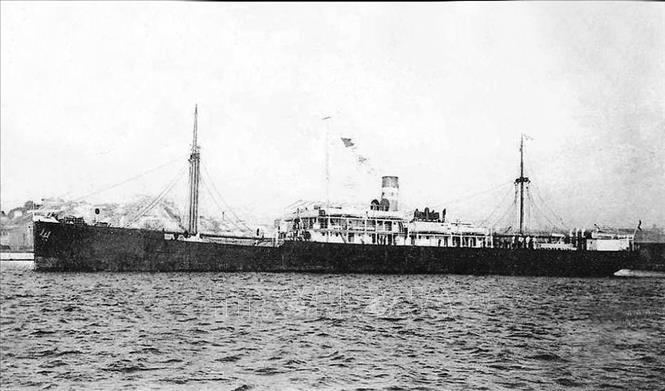
“Dreaming of water at night, seeing its shape during the day”
Faced with the loss of his country and home, witnessing the brutal exploitation of the colonialists and feudal lackeys, and the suffering of the working people, the young man Nguyen Tat Thanh soon formed the desire to find a way to liberate the nation and had an independent and creative vision compared to his predecessors. He decided to leave to find a way to save the country, with a burning determination: “Freedom for my people, independence for my Fatherland, that is all I want, that is all I understand” (1).
And on June 5, 1911, with the new name Van Ba, the young man Nguyen Tat Thanh boarded the ship Amiral Latouche Tréville, leaving Nha Rong port, starting a journey to find a way to save the country. The purpose of this trip, more than 10 years later, in 1923, he answered the Russian poet and journalist Osip Mandenxtan: "At the age of thirteen, for the first time I heard the words Liberty, Equality, Fraternity... The French said so and from that time, I really wanted to get acquainted with French civilization, wanted to find what was hidden behind those words...".
Another time, answering the American writer Anna Louise Strong, he said: "The Vietnamese people, including my father, often asked each other who would help them escape from French rule. Some thought it would be Japan, others thought it would be England, and some thought it would be America. I felt I had to go abroad to see for myself. After seeing how they were doing, I would return to help my people" (2).
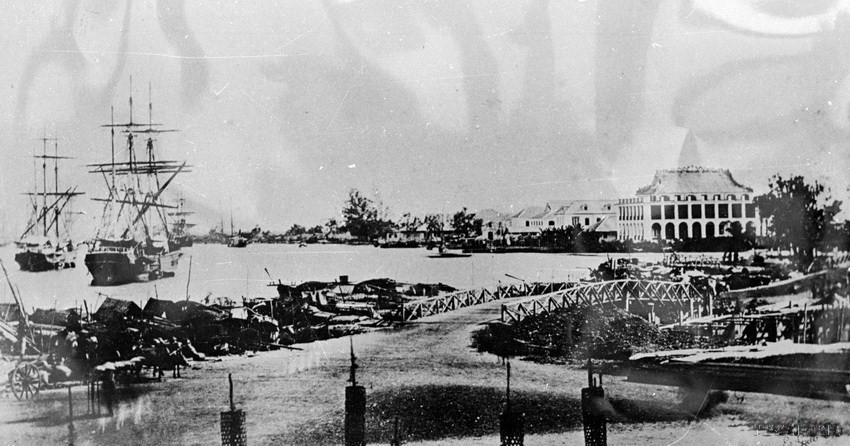
During the 10 years from 1911 to 1920, he took advantage of every opportunity to visit many places in the world. His footprints were imprinted on many countries in the continents of Europe, Asia, Africa, and America. In particular, he stayed for quite a long time in the US, England, and France. He immersed himself in the lives of the working people, doing any job to live and work, such as: kitchen assistant, snow shoveling, furnace lighting, photography, gardening, painting for hire...
Poet Che Lan Vien described these difficulties and hardships of Uncle Ho through the following verses: “Do you remember, oh cold wind of Paris/A pink brick, Uncle Ho fought against a whole season of ice/And fog of London, do you remember/The drop of sweat that Uncle Ho dropped in the middle of the night?” (The Man in Search of the Shape of Water).
30 years - it was a long journey with many hardships and challenges that he went through with the sacred and noble purpose: "Finding the shape of the country". The shape of the country is "The way the whole nation stands"; it is independence, freedom, food, and happiness of the people. That ideal transcends all common associations of geographical space ("A corner of the homeland, half a familiar life"). That ideal is not a metaphysical dream in the distant mist but exists concretely, creating the value of human life. Ho Chi Minh's path is the path of noble, universal humanism, aiming at the basic rights that nature has given to all people in the world (as in the "Declaration of Independence" that he emphasized). But it is a thorny path, going through "red fire and cold water".
“This is the path that will liberate us”
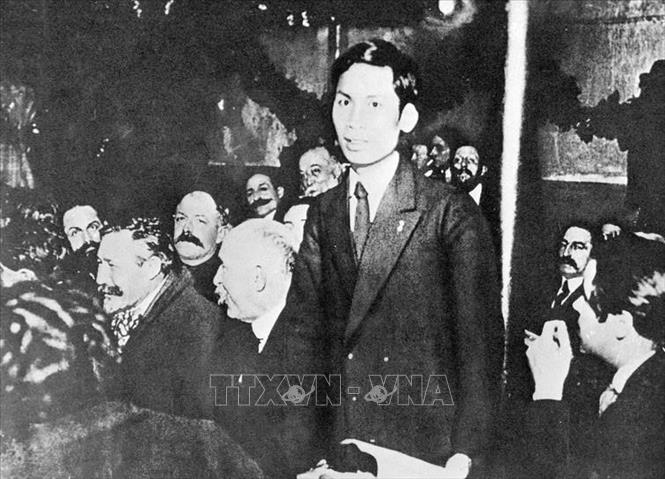
The success of the Russian October Revolution in 1917 had a great influence on his feelings and awareness. In early 1919, he joined the French Socialist Party. On June 18, 1919, under the name Nguyen Ai Quoc, he represented Vietnamese patriots in France and sent a petition to the Versailles Conference asking for freedom, democracy, and national equality for the people of Annam. Although the petition was not accepted, it was widely spread, causing a great resonance in French public opinion, awakening the fighting spirit of the colonies; at the same time, it also brought him a realization that nations wanting to be liberated could only rely on their own strength.
In 1920, Nguyen Ai Quoc encountered Marxism-Leninism through the "First Draft of Theses on the National and Colonial Questions". Lenin's theses came to Nguyen Ai Quoc like a new ray of light illuminating the path to national salvation that the patriotic young man was seeking. Later, when recounting that important event, Uncle Ho said: "Lenin's theses made me so moved, excited, enlightened, and confident! I was so happy that I cried. Sitting alone in my room, I spoke loudly as if speaking before a large crowd: My compatriots, who are suffering from misery! This is what we need, this is the path to our liberation!"(3)
With a correct patriotic stance, he pointed out the truth: "To save the country and liberate the nation, there is no other way than the proletarian revolutionary path." And "Only socialism and communism can liberate oppressed nations and workers around the world from slavery." This conclusion affirmed the profound transformation in Nguyen Ai Quoc's thinking, from a true patriot to a communist - the first communist party member of Vietnam.
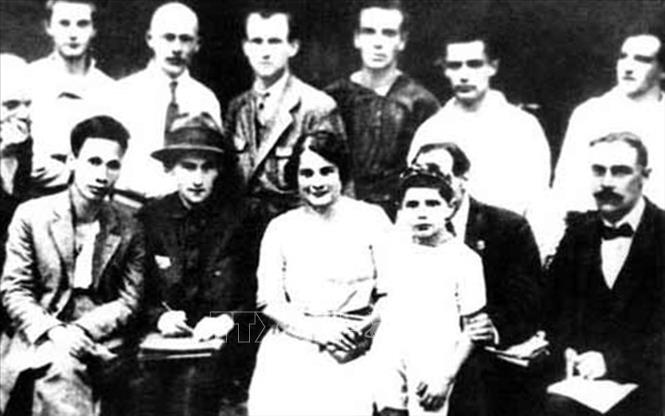
From 1921 to 1930, Nguyen Ai Quoc tried his best to spread Marxism-Leninism to the workers' movement and the Vietnamese patriotic movement, preparing the theory for the birth of the Communist Party of Vietnam. With the works "The Verdict of the French Colonial Regime" and "The Revolutionary Path", especially the publication of the Thanh Nien newspaper on June 21, 1925, he prepared the political path to move towards the establishment of the Party. During this time, he also focused on preparing the organization and cadres through the establishment of the Vietnam Revolutionary Youth Association (1925) and organizing many cadre training courses and sending them to study in the Soviet Union...
When the conditions for the establishment of the Party were ripe, on February 3, 1930, under his chairmanship, in Hong Kong (China), the Conference to unify three communist organizations agreed to establish a unified party, named the Communist Party of Vietnam. With the birth of the Communist Party of Vietnam and the Party's first political platform, the Vietnamese revolutionary path was basically formed, and the correct path to save the country for Vietnam was basically determined.
You come back to bring spring
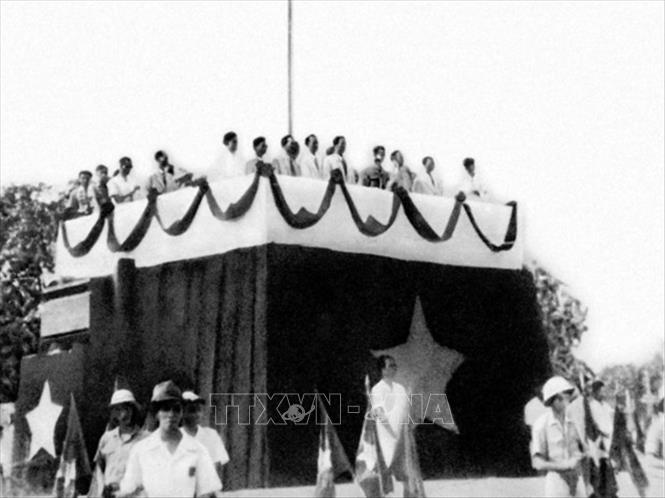
In early 1941, after 30 years of working abroad, he returned to the country to directly lead the revolutionary struggle. He chaired the 8th Central Conference (May 1941), deciding to change the revolutionary strategy to suit the rapid changes in the international and domestic situation, putting the task of national liberation first, organizing and mobilizing the entire nation's forces; establishing the Viet Minh Front; building armed forces and bases, creating vibrant and strong revolutionary movements nationwide.
In August 1945, under the leadership of the Party, headed by President Ho Chi Minh, the Vietnamese people united into one bloc, promoted the strength of the entire nation, and achieved the victory of the August Revolution in 1945, overthrowing the colonial and feudal regimes, and establishing the Democratic Republic of Vietnam - the first people's democratic state in Southeast Asia.
Then, under the light of Ho Chi Minh's thought, generations of Vietnamese people have firmly walked on the path he chose. That is the path of national independence and socialism, a path with a timeless vision that has led our country and people to overcome countless difficulties and challenges, going from one victory to another - gaining national independence, unifying the country; carrying out the renovation process, industrializing and modernizing the country and actively integrating internationally.
Those victories are the clearest evidence of the great, enlightening, guiding values of Ho Chi Minh's ideology, morality, and style. At the same time, they demonstrate the intellectual stature and mettle of our Party in creatively applying, supplementing, and developing Marxism-Leninism and his ideology not only in the cause of national liberation but also in the cause of innovation, national development, construction, and defense of the Fatherland today.
--------------------------------------------------
(1): Communist Party of Vietnam: Political report of the Party Central Committee at the 4th National Congress of Delegates, Truth Publishing House, Hanoi, 1975, pp. 5,6.
(2): Nhan Dan Newspaper No. 4062, May 18, 1965
(3): Ho Chi Minh, Complete Works, National Political Publishing House, Hanoi, 2011, volume 12, p.562
Source:Vietnam News Agency
Newer news
Older news